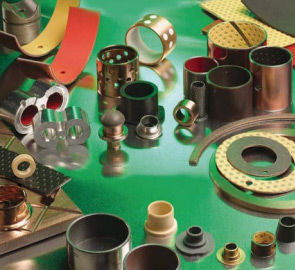
Contact Details:
GGB (formerly Garlock Bearings)
Wellington House
Starley Way
Birmingham International Park
Birmingham
Birmingham
B37 7HB
United Kingdom
Tel: +44 (0)121 7679100
Fax: +44 (0)121 7817313
Send Enquiry | Company Information

Metal-polymer plain bearings improve performance, reliability
Product News Thursday, January 27, 2011: GGB (formerly Garlock Bearings)
Bearings play an important role in many types of machinery. Metal-polymer and solid-polymer plain bearings have been used for more than 50 years to cost effectively improve performance and reliability in a wide variety of engineering applications. Produced from polytetrafluoroethylene (PTFE) and other suitable thermoplastics, these types of bearings increasingly are replacing both traditional metal and bimetallic bearings, as well as more costly roller and needle bearings.
Environmental factors
Concurrently protecting the environment and human health has become a high-priority government and social objective. EU Guideline 2000/53/EC, for example, bans the use of certain hazardous materials, such as lead, in bearings. Moreover, bearings are often used with harmful lubricants that can be discharged into the environment, resulting in increased attention to biodegradable alternatives such as mineral-oil-based lubricants. Bearing manufacturers too are doing their part, offering new, more environmentally friendly options for bearing materials and properties. Environmental issues pertaining to lubrication systems may soon lead to a demand for maintenance-free bearings which for economic reasons offer an extended service life. It also appears likely that the solution to this problem will be polymer and metal-polymer plain bearings.
Metal-polymer plain bearings offer significant advantages over other types of bearings. Space and weight are critical factors in most mechanical systems. In others, extreme loads and oscillating movements, which can damage rolling-element bearings, must be accommodated. Metal-polymer bearings exhibit low friction and wear over wide range of loads without the need for additional lubrication. Yet, polymers are subject to a number of limitations, including relatively low mechanical and creep strengths, high thermal expansion and low thermal conductivity. However, these limitations can be overcome by careful material selection and proper bearing design. Metal-polymer plain bearings feature a thin polymer layer overlaid and impregnated into a porous intermediate layer of sintered bronze. The intermediate layer itself Metal-polymer plain bearings improve performance, reliability is permanently bonded to a metal backing. The resulting composite structure combines the tribological advantages of polymers with the mechanical strength of metal.
Today, a wide selection of leadfree polymers and metal-polymer plain bearing materials are available to meet EU environmental requirements. These materials make it possible for design engineers to improve the performance of countless dry and lubricated mechanical devices and to increase their service life. Metal-polymer plain bearings are especially suitable for applications where costs must be reduced by eliminating lubricants; in lubricated applications where a hydrodynamic film can form only with difficulty; and in applications that require the special friction properties of PTFE.
